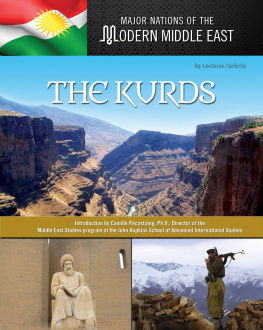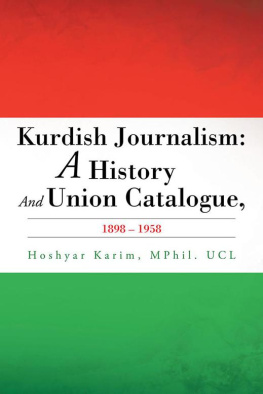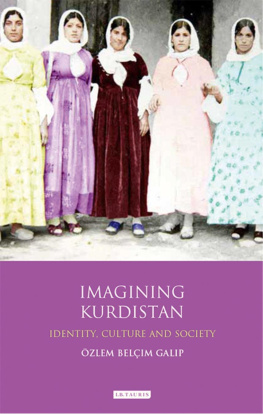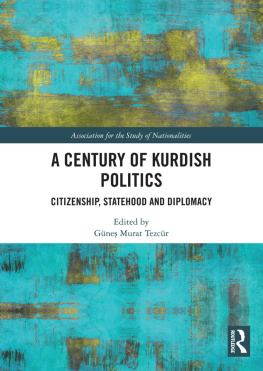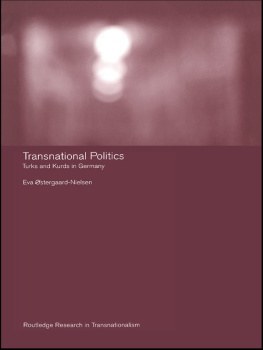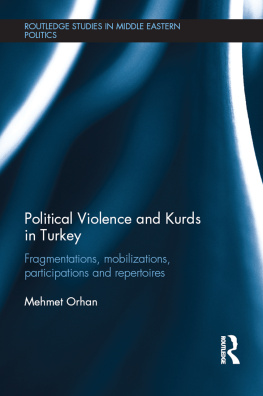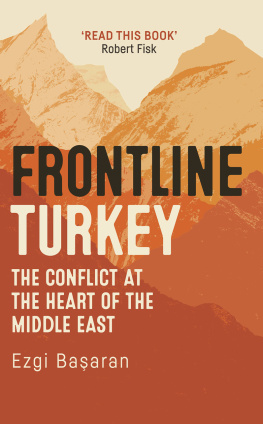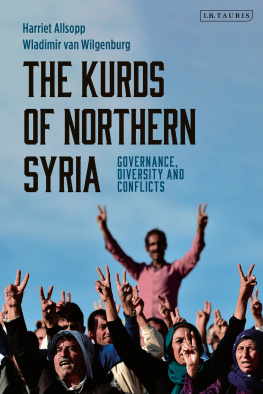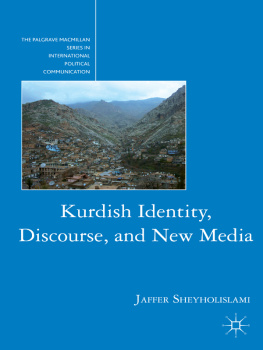Günes Murat Tezcür (editor) - Kurds and Yezidis in the Middle East: Shifting Identities, Borders, and the Experience of Minority Communities (Kurdish Studies)
Here you can read online Günes Murat Tezcür (editor) - Kurds and Yezidis in the Middle East: Shifting Identities, Borders, and the Experience of Minority Communities (Kurdish Studies) full text of the book (entire story) in english for free. Download pdf and epub, get meaning, cover and reviews about this ebook. year: 2021, publisher: I.B. Tauris, genre: Politics. Description of the work, (preface) as well as reviews are available. Best literature library LitArk.com created for fans of good reading and offers a wide selection of genres:
Romance novel
Science fiction
Adventure
Detective
Science
History
Home and family
Prose
Art
Politics
Computer
Non-fiction
Religion
Business
Children
Humor
Choose a favorite category and find really read worthwhile books. Enjoy immersion in the world of imagination, feel the emotions of the characters or learn something new for yourself, make an fascinating discovery.
- Book:Kurds and Yezidis in the Middle East: Shifting Identities, Borders, and the Experience of Minority Communities (Kurdish Studies)
- Author:
- Publisher:I.B. Tauris
- Genre:
- Year:2021
- Rating:3 / 5
- Favourites:Add to favourites
- Your mark:
Kurds and Yezidis in the Middle East: Shifting Identities, Borders, and the Experience of Minority Communities (Kurdish Studies): summary, description and annotation
We offer to read an annotation, description, summary or preface (depends on what the author of the book "Kurds and Yezidis in the Middle East: Shifting Identities, Borders, and the Experience of Minority Communities (Kurdish Studies)" wrote himself). If you haven't found the necessary information about the book — write in the comments, we will try to find it.
The diversity of Kurdish communities across the Middle East is now recognized as central to understanding both the challenges and opportunities for their representation and politics. Yet little scholarship has focused on the complexities within these different groups and the range of their experiences. This book diversifies the literature on Kurdish Studies by offering close analyses of subjects which have not been adequately researched, and in particular, by highlighting the Kurds relationship to the Yazidis. Case studies include: the political ideas of Ehmede Xani, the father of Kurdish nationalism; Kurdish refugees in camps in Iraq; the perception of the Kurds by Armenians in the late Ottoman Empire and the Turks in modern Western Turkey; and the important connections and shared heritage of the Kurds and the Yazidis, especially in the aftermath of the 2014 ISIS attacks.
The book comprises the leading voices in Kurdish Studies and combines in-depth empirical work with theoretical and conceptual discussions to take the debates in the field in new directions. The study is divided into three thematic sections to capture new insights into the heterogeneous aspects of Kurdish history and identity. In doing so, contributors explain why we need to pay close attention to the shifting identities and the diversity of the Kurds, and what implications this has for Middle East Studies and Minority Studies more generally.
Günes Murat Tezcür (editor): author's other books
Who wrote Kurds and Yezidis in the Middle East: Shifting Identities, Borders, and the Experience of Minority Communities (Kurdish Studies)? Find out the surname, the name of the author of the book and a list of all author's works by series.



